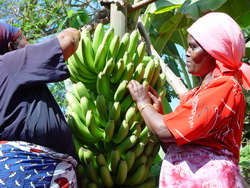
Suppressing Growth: Opposition to GMOs Hurting Developing Nations
March 16, 2016| |

Opponents of agricultural biotechnology have argued that GMOs would benefit only industrialized nations, and would price farmers from developing nations out of the market. The authors wrote that these groups were wrong. Experience and data have shown that crops improved through biotechnology provide significant benefits for farmers. Biotech-improved seeds are even more important to farmers in developing countries than in developed nations, because the former have less capacity and access to other innovations that boost productivity (e.g., modern tractors, etc.), but they can afford improved seeds. This is the reason why farmers in developing nations plant more biotech-improved seeds than farmers in industrial nations, despite massive European and advocacy group efforts to discourage them.
For more details, read the summary of the report, or download the full report on the ITIF website.
| |
Biotech Updates is a weekly newsletter of ISAAA, a not-for-profit organization. It is distributed for free to over 22,000 subscribers worldwide to inform them about the key developments in biosciences, especially in biotechnology. Your support will help us in our mission to feed the world with knowledge. You can help by donating as little as $10.
-
See more articles:
-
News from Around the World
- Suppressing Growth: Opposition to GMOs Hurting Developing Nations
- New Study Identifies Sweet Corn Genes for Crowding Tolerance
- Study Suggests Climate Change Impact on Agriculture is Underestimated
- Researchers Discover Gene That Protects against Toxic Byproducts of Photosynthesis
- Scientists Unravel Unknown Receptors and Mechanism for Plant Fertilization
- New EU Project Focuses on Crops Important for Food Security and Bio-Economy
-
Research Highlights
- Ectopic Expression of PtCYP714A3 from Populus trichocarpa Improves Salt Tolerance in Transgenic Rice
- Kn1 Gene Overexpression Improves Transformation Efficiencies of Citrus Cultivars
- OsBBX14 Delays Heading Date in Rice
-
Beyond Crop Biotech
- Abiotic Stress Tolerance Genes Characterized in Brown Seaweed
- Scientists Develop GM Microbe for Monogastric Animal Nutrition
- Researchers Discover MicroRNA that may Protect from Obesity and Diabetes
-
Announcements
- Genome Editing and Gene Modulation Congress 2016
- 3rd Plant Genomics Congress: Asia
- 5th International Conference and Exhibition on Metabolomics
-
Read the latest: - Biotech Updates (February 18, 2026)
- Gene Editing Supplement (January 28, 2026)
- Gene Drive Supplement (February 22, 2023)
-
Subscribe to BU: - Share
- Tweet
